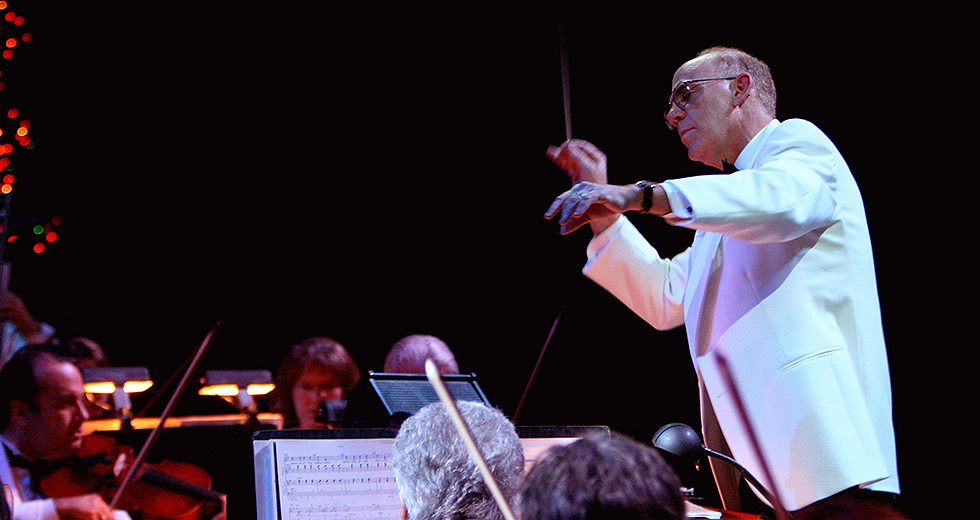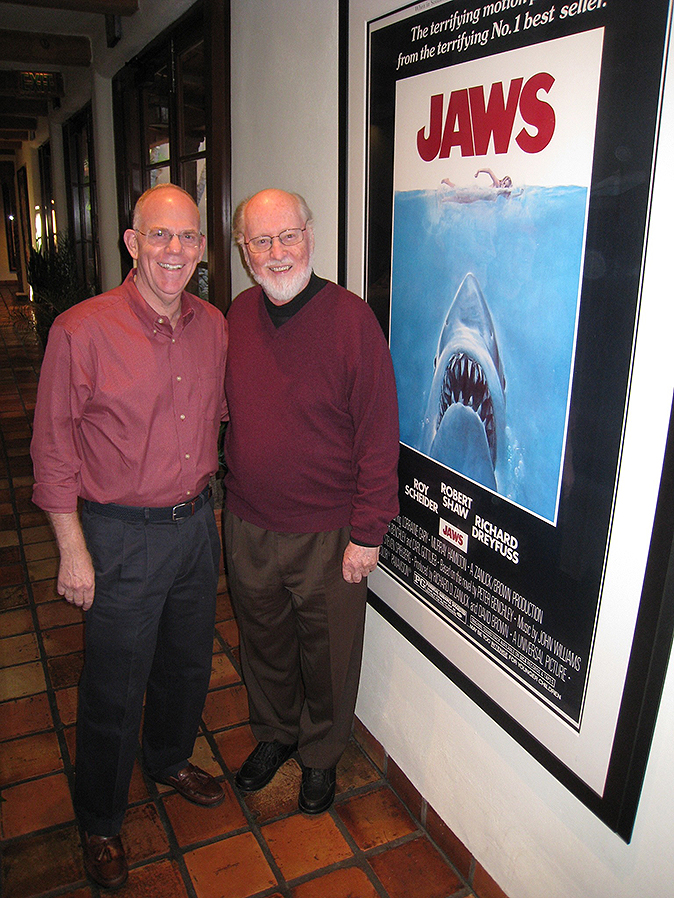
Although it’s just two repeated notes, the ominous attack theme in “Jaws” ranks among the best known in all cinema. “If someone asks me what is the perfect film score, I could come up with several answers, but at the very top of the list would be ‘Jaws’ and ‘Psycho,’” said Richard Kaufman, now in his 11th year as a guest conductor for the CSO at the Movies series.
But as popular as the music is and as iconic as the 1975 movie has become, most younger people have never experienced the thriller on the big screen, and many older moviegoers have probably not seen it in that format since its debut. Concertgoers will have a rare opportunity to do just that on June 28-30 when “Jaws” is screened at Symphony Center with Kaufman and the Chicago Symphony Orchestra performing John Williams’ Oscar-winning score live.

Richard Kaufman (left) and John Williams worked together on the recording of the “Jaws” soundtrack.
The CSO concerts will be just the second performances ever of this film in a concert format, after its debut May 25-26 by the Boston Pops. Presentations of this kind take time, because a version of the film has to be made with the original soundtrack removed, and scores also have to be assembled for the orchestra. “It’s just a matter of getting the films ready one by one,” Kaufman said. “We’ve done ‘Raiders [of the Lost Ark],’ ‘E.T [the Extra-Terrestial]’ and ‘Home Alone.’ Now here’s the next one in the series. And ‘Jurassic Park’ is not far behind.’
To call Williams one of the most esteemed film composers of all time is almost an understatement, considering the extraordinary breadth and quality of his accomplishments: the scores for such films as “Close Encounters of the Third Kind” (1977), “Superman” (1978), “Schindler’s List” (1993), “Harry Potter and the Sorcerer’s Stone” (2001), “Catch Me If You Can” (2002) and “Lincoln” (2012). Consider that with 50 to his credit, the composer trails only Walt Disney in the total number of Academy Award nominations, and in 2015 the American Film Institute selected his score for “Star Wars” (1977) as the greatest of all time.
Now 85, Williams he shows no signs of slowing down. Indeed, he is at work on the music for two upcoming blockbusters “Indiana Jones 5” and “Star Wars IX.” “It’s so exciting to know that he is still creating,” Kaufman said. “I can’t imagine a world of film music without John Williams having a score each year.” (Next season, Williams also is scheduled to conduct the CSO in a selection of his works on April 26-29.)
Kaufman, who joined MGM in 1984 and supervised music for the studio’s television projects for 18 years, believes there are at least two ways to appreciate Williams. The first is his astounding popularity. “John’s name is a household name, not only in the United States but all over the world,” Kaufman said. The second is the impeccable, unerring artistry behind that acclaim. “That’s really, as they say, where the rubber meets the road, and John is a composer who is not only an extraordinary writer of music and theme, but he is also an amazing dramatist,” Kaufman said. “So that when he looks at a film, it’s not only his ability to write the music, but it’s also his ability to understand dramatically what the music does for a film.”
Compared with movie-composing legends of the past such as Erich Korngold, Alfred Newman, Max Steiner, Franz Waxman and Victor Young, “John is easily in the same category in terms of his composition, his writing of melody and theme and the way he uses the colors of the orchestra like a painter with a palette,” he said. “And he uses them in a way that makes just makes magic.”
Setting a box-office record that lasted until “Star Wars,” Steven Spielberg’s “Jaws” launched the era of summer blockbuster films, one that continues to this day. One of the great movies of its era, “Jaws” was selected in 2011 for inclusion on the National Film Registry by the Library of Congress. Based on Peter Benchley’s 1974 novel, “Jaws” tells the relatively straightforward story of a New England seaside town that is menaced by a Great White shark. “Then you have John’s music, which takes you into that room of fear and anticipation of it,” Kaufman said. “Alfred Hitchcock said, ‘There is no terror in the bang, only in the anticipation of it.’ In this case, you hear the two notes, the infamous half-step notes, and you never know if somebody’s going to get it, if the shark is there or it’s not. And it just sets you up so that when it happens, it’s amazing the emotion that those two notes have.”
Kaufman played violin on the soundtrack for six of Williams’ films, and he recalls the recording of the music for “Jaws” at the 20th Century-Fox studios taking four days with Williams serving as conductor. “It was one of those projects where you really knew that something special was happening,” he said. “People wonder how long films will be remembered and how film scores will be received, and as we were playing it, I thought this is the kind of thing that everybody is going to see.”
In 1975, Kaufman and a friend, an Emmy-winning composer, later went to see “Jaws” in the theaters because he was so eager to learn how it turned out. When the two were leaving the movie, Kaufman asked his companion for his assessment. ‘He said, ‘Well, it’s the perfect score,” Kaufman recalled. “Four words, and that basically summarized what John did for that film.”